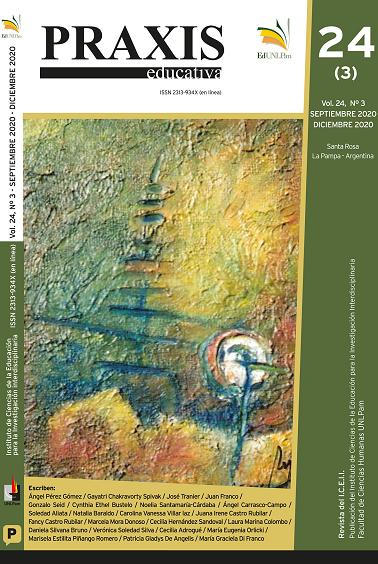Coloniality of Power "and processes of deconstruction of the Nation-States in Latin America" (Biography for Aníbal Quijano: The Andean Don Quixote and the Pampas)
DOI:
https://doi.org/10.19137/praxiseducativa-2020-240312Keywords:
coloniality of power, decolonial thought, deconstruction, Nation-States, Latin America.Abstract
The global modifications and transformations suffered from modernity, as a historical construction linked to the conquest of America, constantly reissue a kind of inequity and also redistributive “blind spots” that draw “naturally” the (unequal) horizons for our existence. Starting from decolonial studies, the ethical question about those otherness denied in our history made possible an “other” path of subjective intellection: not only in relation to the founding and historical processes with which modernity unilaterally promoted its own walk, but, fundamentally, in relation to the threshold of possibilities of transformation of our present and in our future. In this way, the changes of logic that allow granting new meanings take precisely the set of those alterities not taken into account by modernity and constituted from that “non-identity” as “the decolonial engine of History”. Trying to review the known and rename the everyday, through theoretical-political categories that challenge our colonial history, will contribute to understanding the current insistence of the coloniality of power; and, at the same time, contextualize the emergence of certain political, social, educational and cultural practices that erupt unprecedentedly, giving rise to new processes of “deconstruction” of the Nation-States in order to counteract it.
Downloads
References
Abbagnano, N. yVisalberghi, A. (1993). Historia de la Pedagogía.México: FCE.
Bauman, Z.(2005). Globalización, consecuencias humanas. México: FEC.
Castro Gómez, S. (2007).Decolonizar la universidad. La hybris del punto cero y el diálogo de saberes.En S.CastroGómez y R. Grosfoguel (eds.), El giro decolonial. Reflexiones para una diversidad epistémica más allá del capitalismo global. Bogotá: Pontificia.
Cervantes, M. (1943). Obras completas. Barcelona: Aguilar.
Comenio, J. (1993). El mundo sensible en imágenes. México: Miguel AngelPurrúaEditores.
Chakrabarty, D. (2008).Al margen de Europa. Barcelona: Tusquets.
De Las Casas, B. (2011).Brevísima relación de la destrucción de las Indias. Medellín: Editorial Universidad de Antioquia.
Dussel, E. (1994). 1492: El encubrimiento del Otro. Hacia el origen del “mito de la modernidad”. La Paz: Plural Ediciones.
Dussel, E. (2009). Política de la Liberación Arquitectónica. Volumen II. Madrid: Trotta.
Fanon, F. (2009).Piel negra, máscaras blancas. Madrid: Akal.
Guaman Poma De Ayala, F. (1987).Nueva crónica y buen gobierno. México: Siglo XXI.
Hemingway, E. (1989). El viejo y el mar. Mérida: Dante Quincenal.
Hinkelammert, F. (1995). Cultura de la esperanza y sociedad sin exclusión. San José: DEI.
Holloway, J. (2010).Crack Capitalism. New York: Pluto Press.
Houtart, F. (2009).Deslegitimar el Capitalismo, Reconstruir la esperanza.Buenos Aires: CLACSO.
Kusch, R. (2007). Obras Completas. Rosario: Editorial Fundación Ross.
Lévinas, E. (2000). Ética e infinito. Madrid: Machado libros.
Lévinas, E. (2001). Entre nosotros. Valencia: Pre-Textos.
Lévinas, E. (2002).Totalidad e infinito. Tratado sobre la exterioridad. Salamanca: Sígueme.
Mignolo, W. (2013). Historias locales/diseños globales. Colonialidad, conocimientos subalternos y pensamiento fronterizo. Madrid: Akal.
Porta, L. yYedaide, M. M. (Comp.). (2017).Pedagogía(s) Vital(es),Cartografías del pensamiento y gestos ético-políticos en perspectiva descolonial. Mar del Plata: Eudem.
Quijano, A. (1992).Colonialidad y modernidad-racionalidad.En H. Bonilla (ed.), Los conquistados. 1492 y la población indígena de las Américas (pp. 437-447). Bogotá: Ediciones Tercer Mundo.
Quijano, A. (2000).Colonialidad del poder, eurocentrismo y América Latina.En E. Lander (comp.) ,La colonialidad del saber: eurocentrismo y ciencias sociales. Perspectivas Latinoamericanas(pp. 201-246). Buenos Aires: CLACSO.
Quijano, A. (2001).Colonialidad del poder, cultura y conocimiento en América Latina.En W. Mignolo (comp.), Capitalismo y geopolítica del conocimiento. El Eurocentrsimo y la filosofía de la liberación en el debate intelectual contemporáneo.Buenos Aires: Ediciones del Signo.
Quijano, A. (2014).Cuestiones y horizontes. De la dependencia histórico-estructural a la colonialidad/descolonialidad del poder.Buenos Aires: CLACSO.
Quijano, A. (2013).Entrevista de Eduardo Arroyo Laguna.Aníbal Quijano: Padre de la Colonialidad del Poder.Recuperado de:www.urp.edu.pe/urp/pdf/anibal_quijano. pdf.
Rivera Cusicanqui, S. (2010). Ch’ixinakaxutxiwa: Una reflexión sobre prácticas y discursos descolonizadores. Buenos Aires: Tinta Limón.
Segalés, J.J.B. (2014). ¿Qué significa pensar desde América Latina? Hacia una racionalidad transmoderna y postoccidental. Madrid: Akal.
Spivak, G. (2013).Sobre la deconstrucción. Introducción a “De la gramatología” de Derrida. Buenos Aires: Hilo Rojo.
Woolf, V. (2018). Tres Guineas. Buenos Aires: Editorial Godot.
Downloads
Published
Issue
Section
License
Copyright Notice
Editorial Committee Educational Praxis Magazine:
I hereby declare that I am the author of the article titled (article name), that it is original and my own and that it was not previously published in any other format or medium. I declare to know that the magazine will not charge me any type of fee under any circumstances, nor will I receive any type of monetary compensation If it were accepted for publication in Educational Praxis, I authorize the aforementioned magazine to publish it digitally and to advertise it on its social networks.
If the work is published, I adhere to the Creative Commons license called "Attribution - Non-Commercial Share Alike CC BY-NC-SA", through which it is allowed to copy, reproduce, distribute, publicly communicate the work and generate derivative works, as long as when the original author is cited and acknowledged. This license has been used since September 2018. In 2016 CC BY NC ND 4.0 was adhered to; and in the years 2017 and 2018 (January-August) CC BY NC 4.0.
This CC BY-NC-SA Share Alike license does not, however, permit commercial use of the work. As an author, the journal may establish additional agreements for the non-exclusive distribution of the version of the work published in the journal, it allows me to self-archive the published articles, in their post-print version, in institutional, thematic repositories, personal web pages or any other relevant use. with the recognition of having been first published in this journal.
Educational Praxis adheres to DORA (Declaration on Research Assessment) signed in San Francisco, California, on December 16, 2012, and to the Declaration of Mexico (Joint Declaration LATINDEX - REDALYC - CLACSO - IBICT).















_(1)2.png)


3.png)











_(2).png)






2.jpg)









